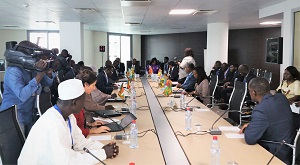
Ministers responsible for water management in 11 Central African states have today approved the Convention for the prevention of conflicts related to the management of shared water resources in Central Africa.
The Convention was negotiated in the framework of the Economic Community of Central African States (ECCAS), with the support of the UNECE secretariat of the Convention on the Protection and Use of Transboundary Watercourses and International Lakes (Water Convention) and the African Development Bank.
The Central African region is rich in transboundary waters, with 16 major transboundary rivers, 5 transboundary lakes and 17 transboundary aquifer systems shared by the 11 ECCAS members (Angola, Burundi, Cameroon, Central African Republic, Chad, Democratic Republic of Congo, Equatorial Guinea, Gabon, Republic of Congo, Rwanda and São Tomé and Príncipe). While cooperation for some of the region’s shared waters is advanced and supported by active joint bodies, the majority are missing a solid framework for cooperation.
The region overall is rich in water resources but there are significant differences in water distribution between the countries. Moreover, the degradation of water resources, the expected increase in water use and the impacts of climate change could be a source of tension and potential conflict. In response, ECCAS member States begun negotiating a regional framework for water cooperation in July 2015 with the aim of ensuring the sustainable management of water resources, making water a driver of cooperation and peace in the region.
The negotiations passed an important milestone this Friday 22 December with the approval of the Convention by a Ministerial meeting held in Brazzaville, Republic of Congo. Following ECCAS procedures, the Convention will be submitted for the signature of Heads of States at their next Summit.
The Convention is strongly rooted in the Water Convention and the Convention on the Law of the Non-navigational Uses of International Watercourses which are both referred to in the preamble. It lays out a number of key provisions, including: rules on equitable and reasonable use of shared resources; the prevention of transboundary impact; transboundary and regional cooperation; the development of basin agreements and the establishment of transboundary basin organizations; and the integrated management of transboundary water resources.
The process of negotiation and in particular the last meeting was supported by the UNECE Water Convention secretariat, including through a training on the Water Convention and more broadly on international water law, to facilitate the ensuing discussions. In addition, the UNECE secretariat presented the Water Convention and the Watercourses Convention at the Ministerial meeting on 22 December. ECCAS Ministers congratulated Chad for the progress towards accession to the Water Convention and encouraged other countries to follow suit.
UNECE stands ready to support the implementation of the regional Convention, building on the experience of facilitating transboundary cooperation for the sustainable management of shared water resources under the Water Convention.

